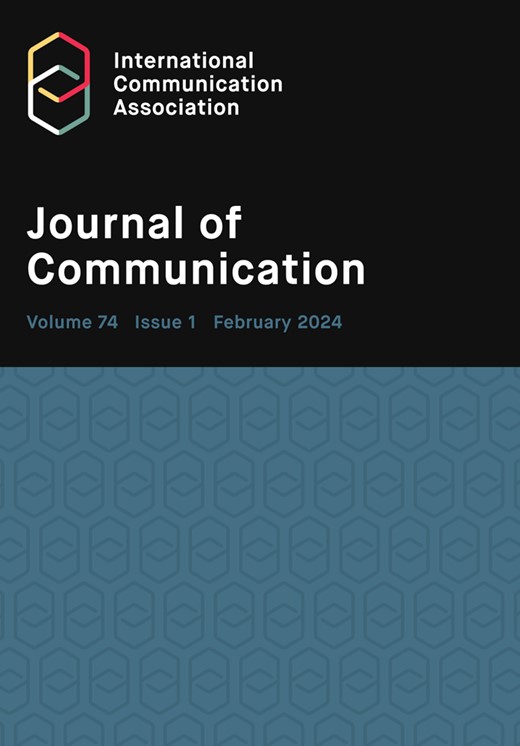数字通信与网络激进主义的兴起
IF 6.1
1区 文学
Q1 COMMUNICATION
引用次数: 0
摘要
目的:本研究的总体目标是探讨数字通信和网络激进主义的兴起。研究方法:本研究采用案头研究方法。案头研究指的是二手数据或无需实地考察即可收集到的数据。案头研究基本上是从现有资源中收集数据,因此与实地研究相比,案头研究通常被认为是一种低成本技术,因为主要成本涉及执行人员的时间、电话费和目录。因此,本研究依赖于已出版的研究、报告和统计数据。这些二手数据可通过在线期刊和图书馆轻松获取。研究结果:研究结果表明,数字通信和网络激进主义的兴起在背景和方法上存在差距。初步的实证审查显示,数字通信从根本上改变了社会和政治活动,使快速动员和广泛传播信息成为可能。这种转变实现了参与的民主化,使不同的声音都能为运动做出贡献。然而,研究也强调了一些挑战,如在线参与的短暂性和依赖集中平台的风险。尽管存在这些挑战,但数字行动主义推动有意义变革的潜力是显而易见的,前提是运动能够维持现实世界的行动并建立有弹性的网络。对理论、实践和政策的独特贡献:网络社会理论、集体行动理论和框架理论可用于今后有关数字通信和网络行动主义兴起的研究。研究认为,将数字通信融入激进主义需要更新理论框架,以反映网络平台的动态性质。在实践中,研究建议活动家加强数字战略,优先考虑数字扫盲和安全问题,并创建吸引人的内容以维持参与。在政策方面,它强调需要制定保护在线活动的法规,同时防止错误信息。会议敦促教育机构将数字活动纳入其课程。研究强调,积极分子、技术开发人员和政策制定者之间的合作对于开发支持性技术至关重要。最后,研究呼吁持续开展研究,以了解数字激进主义的长期影响和伦理意义,并注意到其对社会和政治环境不断演变的影响。本文章由计算机程序翻译,如有差异,请以英文原文为准。
Digital Communication and the Rise of Online Activism
Purpose: The general objective of the study was to explore digital communication and the rise of online activism.
Methodology: The study adopted a desktop research methodology. Desk research refers to secondary data or that which can be collected without fieldwork. Desk research is basically involved in collecting data from existing resources hence it is often considered a low cost technique as compared to field research, as the main cost is involved in executive’s time, telephone charges and directories. Thus, the study relied on already published studies, reports and statistics. This secondary data was easily accessed through the online journals and library.
Findings: The findings reveal that there exists a contextual and methodological gap relating to digital communication and the rise of online activism. Preliminary empirical review revealed that digital communication had fundamentally transformed social and political activism, enabling rapid mobilization and broad dissemination of information. This shift democratized participation, allowing diverse voices to contribute to movements. However, the study also highlighted challenges such as the ephemeral nature of online engagement and the risks of reliance on centralized platforms. Despite these challenges, the potential for digital activism to drive meaningful change was evident, provided that movements could sustain real-world action and build resilient networks.
Unique Contribution to Theory, Practice and Policy: The Network Society Theory, Collective Action Theory and Framing Theory may be used to anchor future studies on digital communication and the rise of online activism. The study concluded that the integration of digital communication in activism required updates to theoretical frameworks to reflect the dynamic nature of online platforms. Practically, it recommended that activists enhance their digital strategies, prioritize digital literacy and security, and create engaging content to sustain participation. Policy-wise, it emphasized the need for regulations that protect online activism while preventing misinformation. Educational institutions were urged to incorporate digital activism into their curricula. Collaborative efforts among activists, tech developers, and policymakers were highlighted as essential for developing supportive technologies. Lastly, the study called for ongoing research to understand the long-term impacts and ethical implications of digital activism, noting its evolving influence on social and political landscapes.
求助全文
通过发布文献求助,成功后即可免费获取论文全文。
去求助
来源期刊

Journal of Communication
COMMUNICATION-
CiteScore
11.60
自引率
5.10%
发文量
41
期刊介绍:
The Journal of Communication, the flagship journal of the International Communication Association, is a vital publication for communication specialists and policymakers alike. Focusing on communication research, practice, policy, and theory, it delivers the latest and most significant findings in communication studies. The journal also includes an extensive book review section and symposia of selected studies on current issues. JoC publishes top-quality scholarship on all aspects of communication, with a particular interest in research that transcends disciplinary and sub-field boundaries.
 求助内容:
求助内容: 应助结果提醒方式:
应助结果提醒方式:


